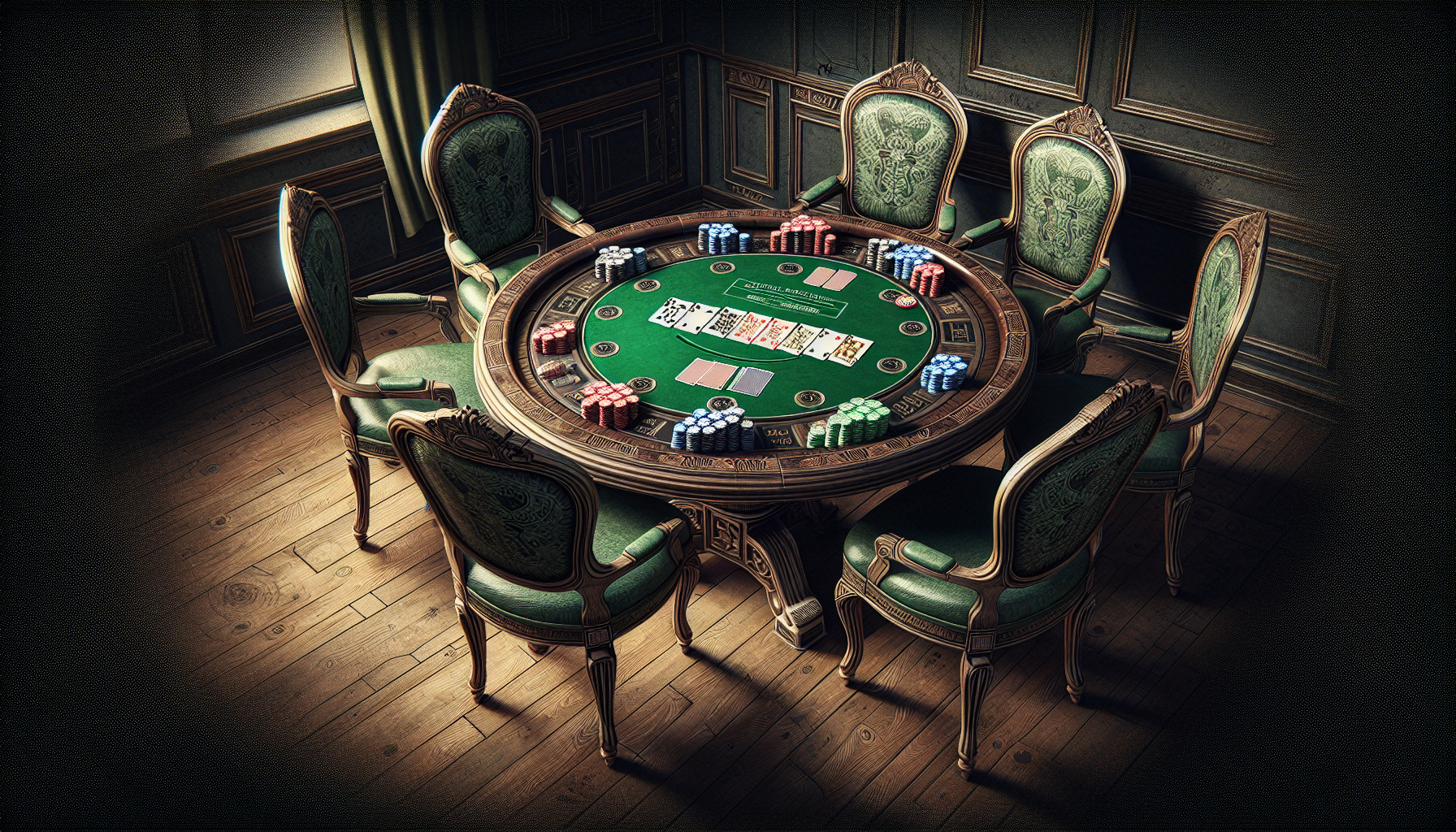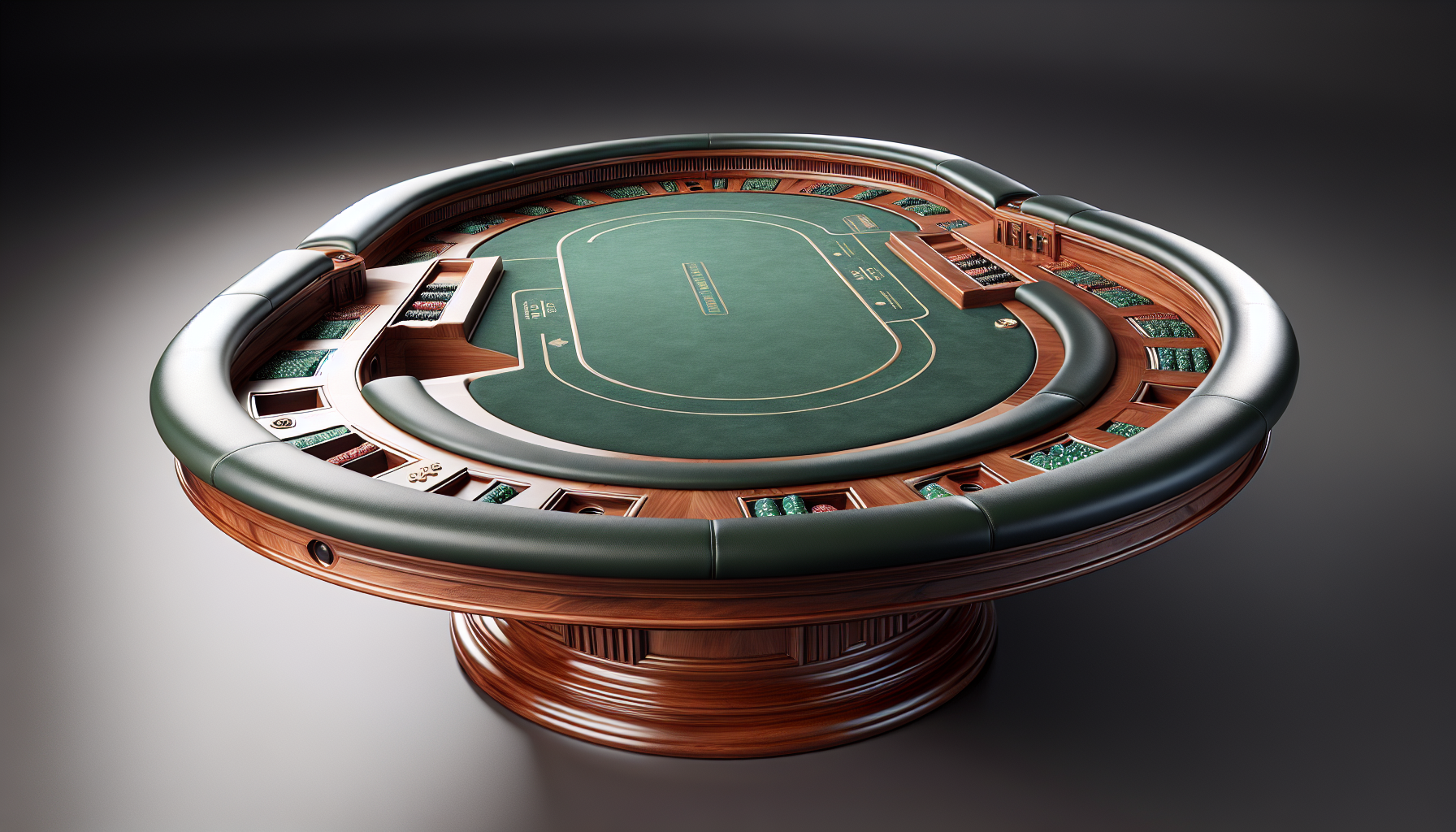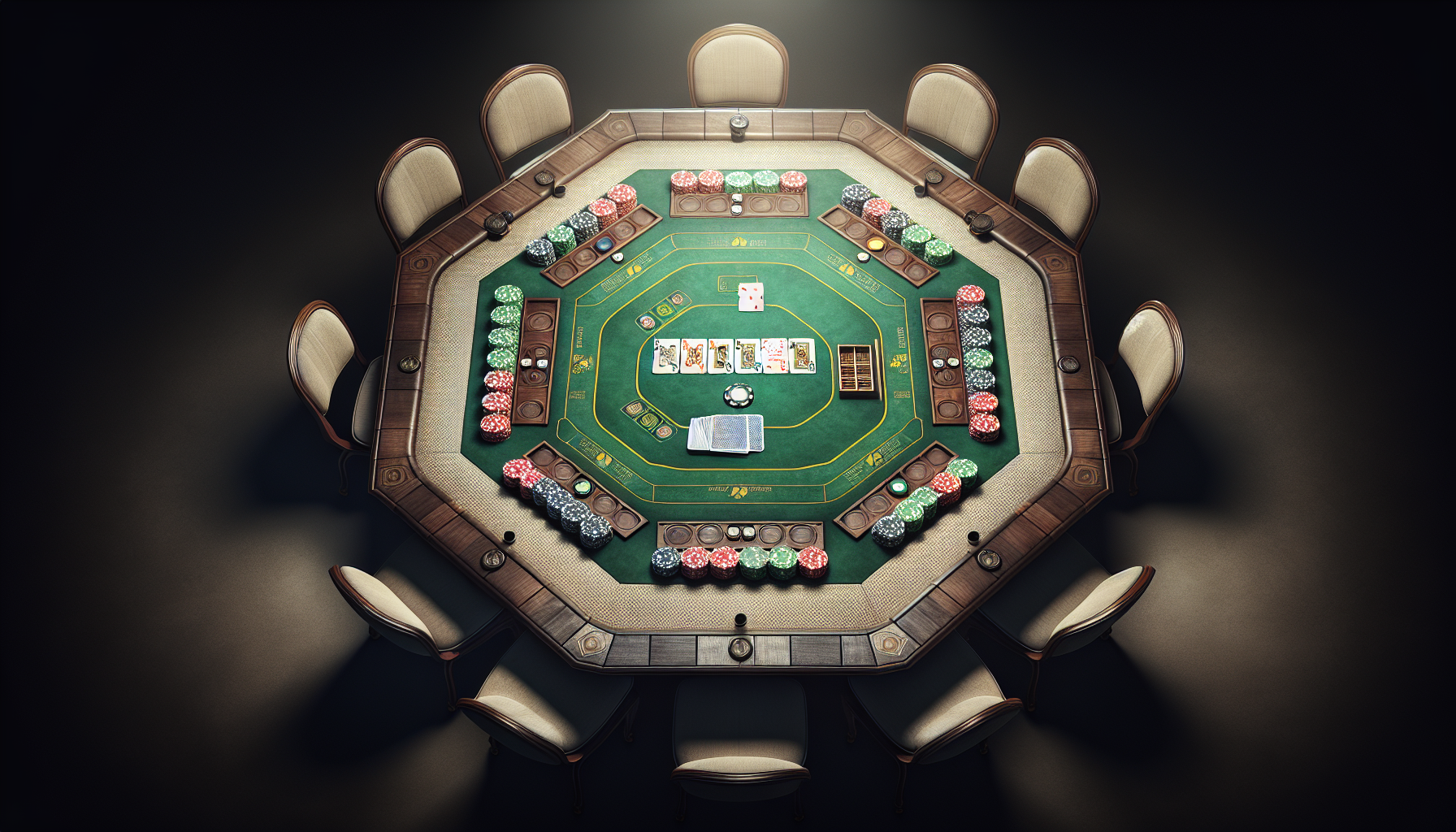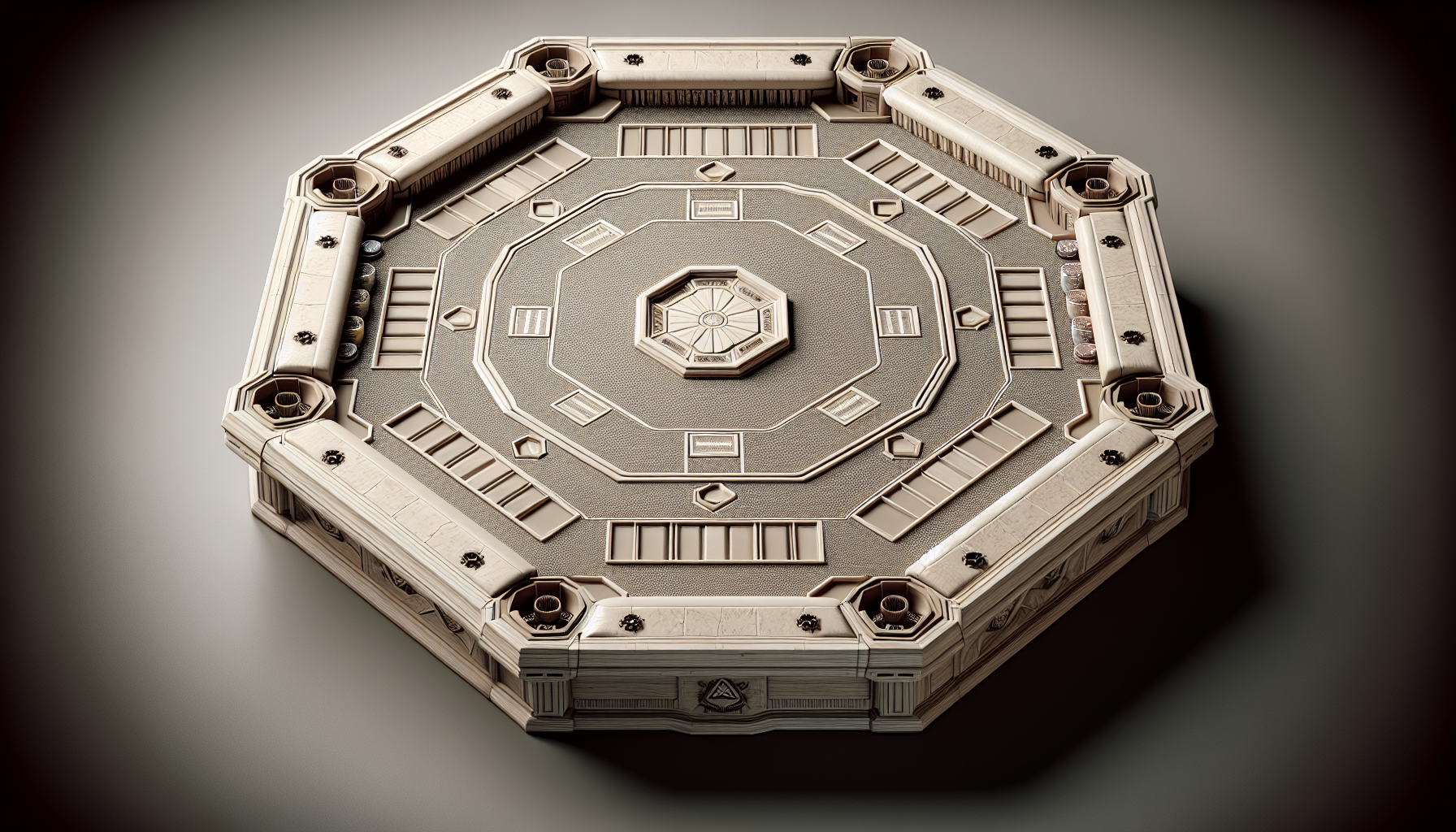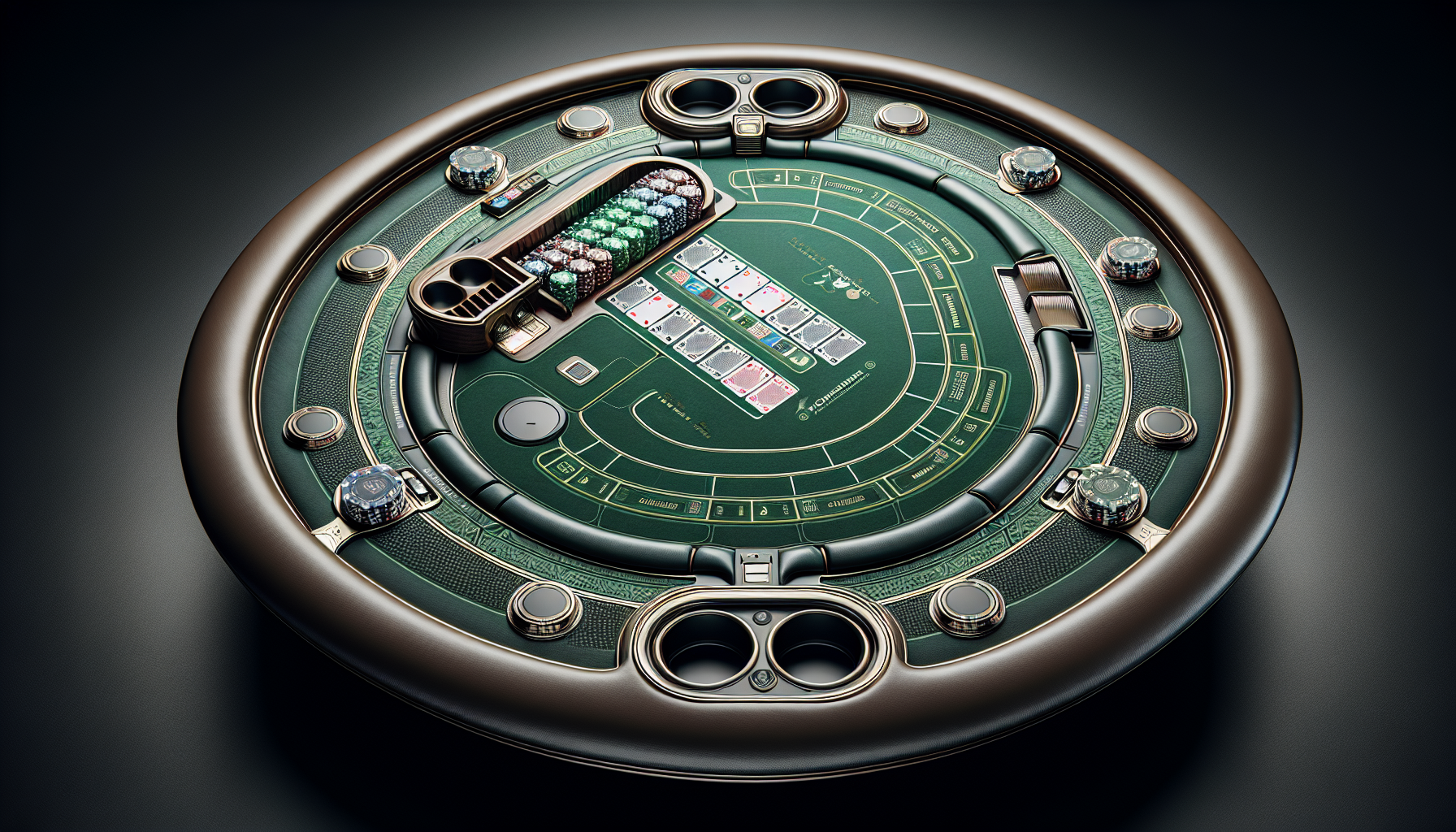Choosing the Right Table Shape
When it comes to selecting a poker table, choosing the right shape is an important consideration. Oval and round poker tables are two popular options that offer different advantages depending on your specific needs.
Oval Poker Tables
Oval poker tables are the classic choice and are commonly found in casino poker rooms, accommodating a large number of players efficiently. The oval shape allows for the dealer to sit in the middle, making card dealing easier. These tables come in various sizes to suit different space requirements (BBO Poker Tables).
Round Poker Tables
Round poker tables are considered the most versatile shape. They take up less space compared to oval tables and are ideal for games with up to 8 players. Dealing cards to all players is more convenient on a round table as it eliminates the need to deal across a large surface, making it easier for all players to participate in the game (BBO Poker Tables).
Round poker tables typically seat four to five players, making them a superior option for smaller groups. Larger options can seat up to seven or eight players, but they require more storage space due to their lack of corners (Just Poker Tables). These tables are generally less expensive than oval tables, ranging from $650.00 to $2,200.00. Premium options, like those from Darafeev, can cost around $4,500.00 (Just Poker Tables).
A standard round or octagonal table with a 54-inch diameter will comfortably seat four to five players. However, for larger groups, it is recommended to choose a 60-inch diameter model or a Texas hold ’em table, which is oval and up to 108 inches (9 feet) long (Americana Poker Tables).
When choosing between oval and round poker tables, consider the number of players you typically have and the available space. Both options offer unique benefits, so selecting the shape that best suits your needs will enhance your poker playing experience.
Features and Benefits
When it comes to choosing a poker table, two popular options are oval tables and round tables. Each shape offers distinct features and benefits that cater to different needs and preferences of poker players.
Oval Tables Overview
Oval poker tables are the classic choice and are commonly found in casino poker rooms due to their ability to accommodate a large number of players efficiently. The oval shape allows for the dealer to sit in the middle, making card dealing easier and ensuring that all players have equal access to the dealer.
These tables come in various sizes to suit different space requirements. Oval tables are ideal for larger poker games and tournaments where multiple players gather to compete. The elongated shape provides ample space for players to comfortably sit and play their hands.
Round Tables Overview
Round poker tables, on the other hand, are considered the most versatile shape. They take up less space compared to oval tables, making them a great option for smaller poker games or home setups. Round tables are suitable for games with up to 8 players, providing an intimate and engaging playing experience.
Dealing cards to all players is more convenient on a round table as it eliminates the need to deal across a large surface. This makes it easier for all players to participate in the game, enhancing the overall gameplay dynamics and interaction.
Round poker tables typically seat four to five players, making them a superior option for smaller groups. However, larger round tables are available that can seat up to seven or eight players, although they require more storage space due to their lack of corners.
When it comes to pricing, round poker tables are generally less expensive than oval tables, offering a range of options to fit different budgets. Prices for round tables typically range from $650.00 to $2,200.00, with premium options like those from Darafeev costing around $4,500.00.
In terms of size, round poker tables are typically 48 to 60 inches in diameter. This makes them the least common design for poker tables, but it provides a more unified size compared to other shapes.
By understanding the features and benefits of both oval and round poker tables, you can make an informed decision based on your specific requirements and preferences. Whether you need a table for larger tournaments or intimate home games, there is a shape that will suit your needs. Explore our collection of poker tables to find the perfect fit for your poker-playing endeavors.
Seating Capacity and Size
When it comes to choosing a poker table, considering the seating capacity and size is essential to ensure that everyone can comfortably participate in the game. In this section, we will explore the seating options and dimensions for both oval and round poker tables.
Oval Table Options
Oval poker tables are a classic choice, commonly found in casino poker rooms due to their ability to accommodate a large number of players efficiently. The oval shape allows the dealer to sit in the middle, making card dealing easier. Additionally, oval tables come in various sizes to suit different space requirements.
Round Table Dimensions
Round poker tables are considered the most versatile shape, taking up less space compared to oval tables. They are ideal for games with up to 8 players, allowing for a cozy and intimate playing experience. Dealing cards to all players is more convenient on a round table as it eliminates the need to deal across a large surface, making it easier for all players to participate in the game (BBO Poker Tables).
The dimensions of a round poker table play a crucial role in determining the seating capacity. Here are some general guidelines:
| Table Diameter | Seating Capacity |
|---|---|
| 44″ to 54″ | 4 to 6 players |
| 54″ or larger | 6 to 8 players |
For a round poker table that comfortably accommodates six people, we recommend a minimum diameter of 52 inches. However, if you have ample space available, it would be advisable to opt for a round table with a diameter of 64 inches (Americana Poker Tables).
Remember, the seating capacity can vary based on the size of the chairs and the comfort level preferred by the players. It’s important to consider the space available and the number of participants when selecting the size of your poker table.
By assessing the seating capacity and size requirements, you can choose between oval and round tables that best suit your gameplay preferences and available space. Whether you opt for the classic oval design or the versatile round shape, ensure that all players can comfortably gather around the table and enjoy the excitement of the game.
Cost Comparison
When it comes to purchasing a poker table, the cost is an important factor to consider. Both oval and round poker tables come with their own pricing considerations, allowing you to choose the option that best fits your budget and preferences.
Oval Tables Pricing
Oval poker tables are generally less expensive than round tables. The pricing for oval tables can range from $650.00 to $2,200.00, depending on factors such as the quality of materials, construction, and additional features. Premium options, like those offered by Darafeev, can have a higher price tag, reaching around $4,500.00 (Just Poker Tables).
Round Tables Pricing
On the other hand, round poker tables also offer a range of price options. Like oval tables, the price of round tables can vary based on factors such as materials, craftsmanship, and added features. Round tables are generally less expensive than oval tables, with prices ranging from $650.00 to $2,200.00. Premium round tables, such as those from Darafeev, can also reach a higher price point of around $4,500.00 (Just Poker Tables).
When considering the cost of a poker table, it’s essential to evaluate your budget and requirements. Factors such as table size, material quality, and design may influence the price range you are comfortable with. It’s worth exploring different options, comparing prices, and considering the long-term value and durability of the table before making a purchase.
Remember, investing in a high-quality poker table ensures a better gaming experience and can provide years of enjoyment for you and your fellow players. Whether you choose an oval or round table, make sure to consider factors beyond just the price, such as the table’s features, construction, and overall aesthetics.
Maintenance and Cleaning
To ensure the longevity and appearance of your poker table, regular maintenance and cleaning are essential. Whether you have an oval or a round poker table, proper care will keep it in top condition for years to come.
Cleaning Oval Tables
To clean an oval poker table, start by removing any loose debris, crumbs, or dust from the surface. This can be done with a hand vacuum or a clean, soft towel. For stains on the felt or speed cloth, a solution of cold water and vinegar (1 tablespoon vinegar to 1 cup of water) can be used. Gently blot the stained area with the solution, taking care not to saturate the fabric. Once the stain is lifted, use a clean, damp cloth to remove any residue. Avoid using harsh chemicals or abrasive materials that could damage the table surface.
Cleaning Round Tables
Round poker tables can be cleaned using similar methods as oval tables. Begin by removing any loose debris or dust with a hand vacuum or a soft cloth. For stains on the felt or speed cloth, a solution of cold water and vinegar can be applied to gently blot the affected area. Again, it’s important to avoid saturating the fabric. After removing the stain, use a clean, damp cloth to wipe away any remaining residue. It’s important to handle the cleaning process with care to prevent any damage to the table surface.
Regular cleaning and maintenance will help preserve the quality and appearance of your poker table. Remember to follow the manufacturer’s guidelines for specific cleaning instructions, as materials and finishes may vary. By taking the time to properly care for your poker table, you can enjoy countless hours of gameplay in a clean and inviting environment.
For more information on poker tables, including options for sale and accessories like poker mats, visit our article on poker table.
Poker Table Etiquette
When participating in a game of poker, it is important to adhere to proper etiquette to ensure a respectful and enjoyable experience for all players at the table. Understanding and following the rules of poker etiquette is essential in maintaining a positive atmosphere, whether you are playing in a casino or a casual setting. Here, we will discuss the proper behavior at the poker table and highlight some mistakes to avoid.
Proper Behavior at the Table
Proper behavior at the poker table involves practicing good sportsmanship and displaying respectful conduct towards fellow players. Below are some key points to keep in mind:
- Maintain a calm demeanor: It is important to remain composed and avoid displaying excessive emotions, whether it be frustration or excitement. This helps to create a relaxed atmosphere and ensures fairness in the game.
- Respect the dealer and other players: Treat the dealer and your fellow players with courtesy and respect. Avoid making derogatory comments or engaging in disrespectful behavior towards others.
- Follow the rules: Familiarize yourself with the rules of the specific poker game you are playing and adhere to them. This includes understanding the betting structure, hand rankings, and any specific rules related to the game variant.
- Avoid discussing your hand or giving advice: Talking about your hand or offering unsolicited advice to other players during a hand is considered bad manners. It can disrupt the flow of the game and potentially give away information that may impact the outcome.
- Maintain focus: When not involved in a hand, it is considered good etiquette to remain quiet and attentive. Avoid distracting other players or engaging in unrelated conversations that may disrupt the game.
Mistakes to Avoid
To ensure fair play and maintain the integrity of the game, there are certain mistakes that should be avoided at all costs:
- Angle shooting: Angle shooting refers to taking advantage of an opponent’s uncertainty or inexperience through deceptive actions. This includes ambiguous bets, misleading statements, or hiding chips to gain an unfair advantage. Angle shooting is frowned upon in poker and can lead to penalties or a negative reputation in the poker community.
- Cheating: Cheating is strictly forbidden at the poker table and can result in severe consequences. This includes actions such as colluding with other players, marking cards, or using fraudulent methods to gain an advantage. Cheating not only undermines the integrity of the game but also damages the trust and fairness essential to the poker community.
By adhering to proper behavior and avoiding these mistakes, you contribute to a positive and enjoyable poker experience for all players involved. Remember, poker is not just about the cards, but also about the camaraderie and respect shared among players at the table.

